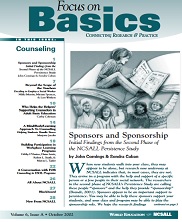This Focus on Basics, slim as it may be, may be more useful than any of us imagined when we chose the subject for this issue. We start off with findings from NCSALL’s Persistence Research that highlight the role of what authors John Comings and Sondra Cuban call “sponsors”: those individuals who help learners get into and stay in programs. The authors encourage programs to look into how learners are being sponsored and consider ways to maximize this crucial resource.
A team of writers—Nikki Merritt, Miriam Spencer, and Lori Withers—from an Independence, Missouri, literacy program, share the process their program went through to document the counseling-related needs of their students. These stark data mobilized the program into hiring a trained social worker. The initial results are positive. Read about them starting on page 7.
Massachusetts’ Cathy Coleman took to the phones to find out what kind of training and support programs and states are providing for staff responsible for counseling students. She found out a lot about the challenges that counselors face, and the innovative practices used to address these challenges. Her report starts on page 10.
Stress interferes with learning, so teacher Marjorie Jacobs, of Cambridge, Massachusetts, decided to incorporate stress reduction activities into her classes. She writes about the science of brain waves and how she uses this information. Try some of the exercises she describes in your classes and let us know your results by participating in the Focus on Basics electronic discussion list (see page 23 for information on how to subscribe; Marjorie’s article starts on page 14).
Counselors are often responsible for recruiting and enrolling learners. Debby D’Amico, Diane Lentz, Robert L. Smith, and Marcia L. Taylor, of a workplace learning program in East Chicago, Indiana, decided to use action research techniques to see if they could understand why eligible learners were not enrolling in their programs. They learned that recruitment materials need to be not just informative but also encouraging. Turn to page 18 for more about their techniques and results.
Students in classes of English for speakers of other languages (ESOL) often have immigration problems layered on top of concerns caused by stress, poverty, and poor health. To find out how ESOL programs handled counseling, I talked with Nazneen Rahman, Education Director at the International Institute of Providence, Rhode Island, and Myrna Atkins, CEO and President of the Spring Institute for Intercultural Learning in Denver, Colorado. Both programs use a teacher as counselor model, and recommend building strong relationships with complementary departments and agencies to ensure that referrals go smoothly. See page 22 for this article.
This issue’s “Blackboard” (page 27) contains a long list of counseling-related articles that have been published in earlier issues of Focus on Basics. World Education, 2002.


